第六讲 态度与态度的改变
第六讲我奉献我快乐团课笔记
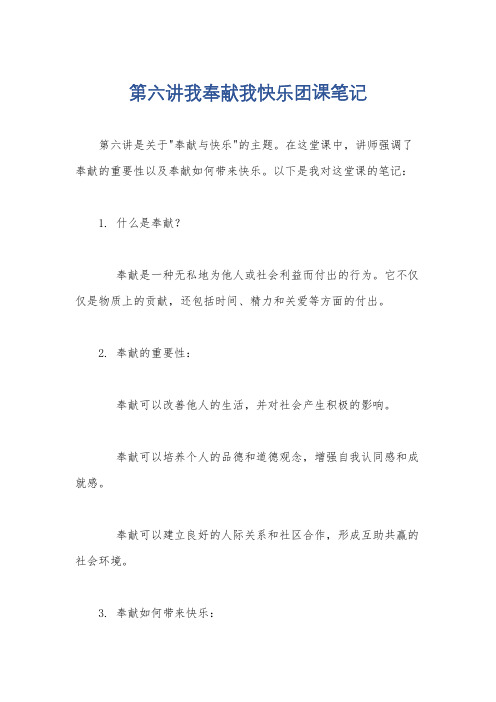
第六讲我奉献我快乐团课笔记
第六讲是关于"奉献与快乐"的主题。
在这堂课中,讲师强调了奉献的重要性以及奉献如何带来快乐。
以下是我对这堂课的笔记:
1. 什么是奉献?
奉献是一种无私地为他人或社会利益而付出的行为。
它不仅仅是物质上的贡献,还包括时间、精力和关爱等方面的付出。
2. 奉献的重要性:
奉献可以改善他人的生活,并对社会产生积极的影响。
奉献可以培养个人的品德和道德观念,增强自我认同感和成就感。
奉献可以建立良好的人际关系和社区合作,形成互助共赢的社会环境。
3. 奉献如何带来快乐:
奉献可以给予他人帮助和支持,从而产生内心的满足感和快乐感。
奉献可以激发他人的感激和回报,增加自尊和自信心,进而带来快乐。
奉献可以让人感受到自己的存在和价值,从而获得内心的平静和满足。
4. 如何实现奉献与快乐的平衡:
在奉献的同时,要注意保护自己的身心健康,避免过度奉献导致疲惫和压力。
寻找适合自己的奉献方式,结合个人的兴趣和能力,选择合适的奉献项目。
培养积极的心态和乐观的态度,将奉献看作是一种享受和成长的过程。
总结起来,奉献与快乐是相辅相成的。
通过奉献,我们可以给
予他人帮助和支持,同时也获得内心的满足和快乐。
重要的是要找到奉献与个人幸福的平衡点,保持身心健康并享受奉献的过程。
这样,我们不仅可以改善他人的生活,还能够提升自身的品德和幸福感。
社会态度(社会心理学) ppt课件

ppt课件
14
消除失调状态的方法
– 改变认知,使之与自己的其他认知 保持一致
– 改变行为,使对行为的认知与其他 认知一致
– 增加新的认知,使原有的认知矛盾 得到合理解决
ppt课件
15
*认知失调及其解释
(1)决策后认知失调 决策几乎总会引起失调,因为我们不得
不在几个选择中作出决定 提高我们选择的对象的评价,或降低对
ppt课件
29
(二)角色扮演法 (三)团体影响法 (四)活动参与法
ppt课件
30
七、偏见
什么是偏见? 偏见是怎样产生的? 如何能够减少偏见?
ppt课件
31
1 什么是偏见
偏见是对某一个体或团体所持有的一种不 公平、不合理的消极否定的态度。
偏见的认知成分是刻板印象
– 刻板化——是把同一个特征归属于群体的每 一个人,而不管群体成员中的实际差异。
行为是在具体的社会环境中表现出来的, 受到情境中的压力,或者考虑到行为的 结果对自身不利,可能会改变行为的方 向,表现出与态度不一致的行为
ppt课件
6
三、态度的形成过程
1 模仿与服从:态度形成始于两种方式,一 为自愿的不知不觉的模仿,另一是屈服于 外界压力的服从。服从是人们为了获得物 质与精神报酬和避免惩罚表现出的相符行 为。
ppt课件
8
四、影响态度形成的因素
1 社会环境影响 主要通过社会规范、准则的要求
和约束,各种思想观念的宣传和教 育,风俗习惯的潜移默化和文化的 熏陶等方式进行。
– 这种影响具有选择性、持久性、多元 性、宏观性
ppt课件
9
2 家庭的影响
– 家庭的教育和抚养方式具有决 定性的作用。
组织行为学-第六讲-价值观与态度
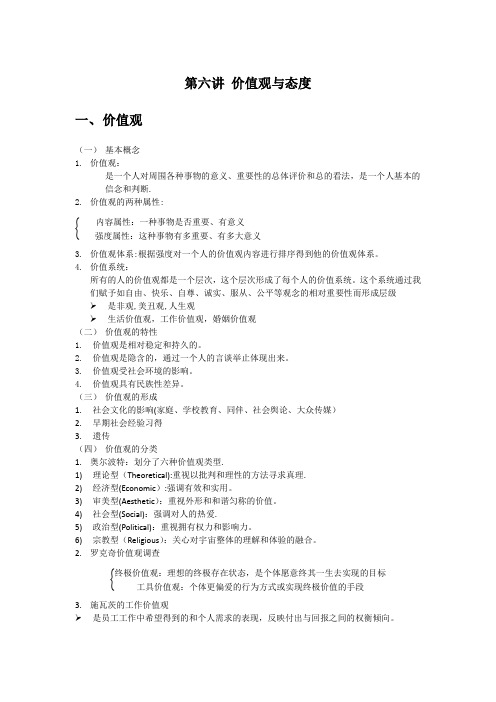
第六讲价值观与态度一、价值观(一)基本概念1.价值观:是一个人对周围各种事物的意义、重要性的总体评价和总的看法,是一个人基本的信念和判断.2.价值观的两种属性:{内容属性:一种事物是否重要、有意义强度属性:这种事物有多重要、有多大意义3.价值观体系:根据强度对一个人的价值观内容进行排序得到他的价值观体系。
4.价值系统:所有的人的价值观都是一个层次,这个层次形成了每个人的价值系统。
这个系统通过我们赋予如自由、快乐、自尊、诚实、服从、公平等观念的相对重要性而形成层级➢是非观,美丑观,人生观➢生活价值观,工作价值观,婚姻价值观(二)价值观的特性1.价值观是相对稳定和持久的。
2.价值观是隐含的,通过一个人的言谈举止体现出来。
3.价值观受社会环境的影响。
4.价值观具有民族性差异。
(三)价值观的形成1.社会文化的影响(家庭、学校教育、同伴、社会舆论、大众传媒)2.早期社会经验习得3.遗传(四)价值观的分类1.奥尔波特:划分了六种价值观类型.1)理论型(Theoretical):重视以批判和理性的方法寻求真理.2)经济型(Economic):强调有效和实用。
3)审美型(Aesthetic):重视外形和和谐匀称的价值。
4)社会型(Social):强调对人的热爱.5)政治型(Political):重视拥有权力和影响力。
6)宗教型(Religious):关心对宇宙整体的理解和体验的融合。
2.罗克奇价值观调查{终极价值观:理想的终极存在状态,是个体愿意终其一生去实现的目标工具价值观:个体更偏爱的行为方式或实现终极价值的手段3.施瓦茨的工作价值观➢是员工工作中希望得到的和个人需求的表现,反映付出与回报之间的权衡倾向。
➢它是个人对工作目的与工作行为的选择和评断标准。
是个人价值观结构中的重要一环,反映了个人在工作上的一般性态度,即个人对工作所持有的信念和偏好。
➢权力;成就;享乐;刺激;普遍主义;仁慈;自我导向;传统;顺从;安全秩序4.Meyer 1998的现代工作价值观➢将工作特征划分为三个结构:舒适与安全,能力与成长,地位与独立。
小学高年级学生读本第六讲《国家一切权力属于人民》说课稿
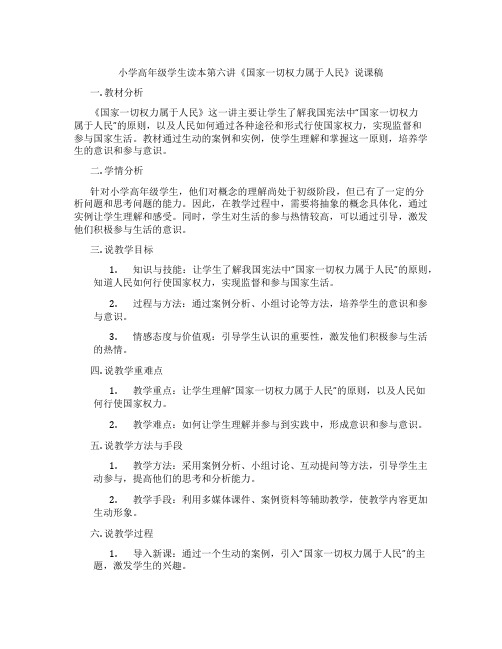
小学高年级学生读本第六讲《国家一切权力属于人民》说课稿一. 教材分析《国家一切权力属于人民》这一讲主要让学生了解我国宪法中“国家一切权力属于人民”的原则,以及人民如何通过各种途径和形式行使国家权力,实现监督和参与国家生活。
教材通过生动的案例和实例,使学生理解和掌握这一原则,培养学生的意识和参与意识。
二. 学情分析针对小学高年级学生,他们对概念的理解尚处于初级阶段,但已有了一定的分析问题和思考问题的能力。
因此,在教学过程中,需要将抽象的概念具体化,通过实例让学生理解和感受。
同时,学生对生活的参与热情较高,可以通过引导,激发他们积极参与生活的意识。
三. 说教学目标1.知识与技能:让学生了解我国宪法中“国家一切权力属于人民”的原则,知道人民如何行使国家权力,实现监督和参与国家生活。
2.过程与方法:通过案例分析、小组讨论等方法,培养学生的意识和参与意识。
3.情感态度与价值观:引导学生认识的重要性,激发他们积极参与生活的热情。
四. 说教学重难点1.教学重点:让学生理解“国家一切权力属于人民”的原则,以及人民如何行使国家权力。
2.教学难点:如何让学生理解并参与到实践中,形成意识和参与意识。
五. 说教学方法与手段1.教学方法:采用案例分析、小组讨论、互动提问等方法,引导学生主动参与,提高他们的思考和分析能力。
2.教学手段:利用多媒体课件、案例资料等辅助教学,使教学内容更加生动形象。
六. 说教学过程1.导入新课:通过一个生动的案例,引入“国家一切权力属于人民”的主题,激发学生的兴趣。
2.案例分析:让学生分析案例中人民如何行使国家权力,实现监督和参与国家生活。
3.小组讨论:让学生分组讨论,分享各自的观点和感受,培养他们的意识和参与意识。
4.总结提升:教师引导学生总结课程要点,强调的重要性,激发他们积极参与生活的热情。
5.课后作业:布置一道相关的思考题,让学生进一步深入思考,巩固所学知识。
七. 说板书设计板书设计主要包括以下几个部分:1.“国家一切权力属于人民”的原则。
态度及其改变 ppt课件
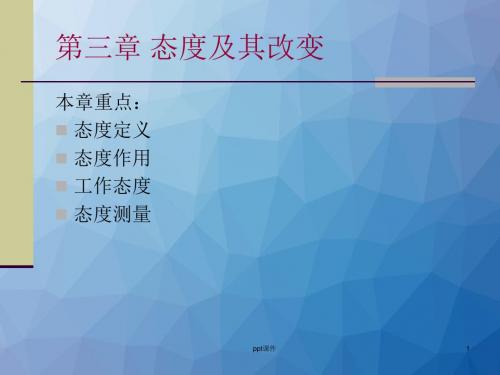
ppt课件
19
预言自我实现
股市传出消息:明天某只股票将会暴跌。持有
这只股票的股民们相信了这个预言,就会纷纷 抛售股票,造成该股暴跌,预言自我应验
ppt课件
20
(3)认知失调理论
态度中认知、情感和行为三种成分一般是协调
一致的。人们总是寻求态度之间、态度与行为 的一致性,当出现不一致时,个体会采取措施, 回归到平衡状态 费斯廷格认为,当认知元素之间协调一致时, 会保持这种协调状态,觉得心安理得,不去改 变态度。而认知元素之间相互矛盾,处于不和 谐状态,个体会感到焦虑、紧张和不安,称之 为认知失调 采取措施包括:改变行为;改变态度;寻找合 适理由(合理化)
年在耶鲁大学做了大量的关于沟通和态度改变 的研究,提出了劝说情境的模式 任何态度改变都是个人的原有态度与外部存在 差异造成的,差异会产生压力、冲突、不协调、 不平衡、不一致等 为缩小差异,减 少压力,个体采取的方式包括: 第一、接受外来影响,改变自己原有态度;第 二、否定或抵制外部影响,维持原有态度
我发现他 也有优点
我不得不 去讨好他
认知协调状态
ppt课件 24
解决认知失调的方式
我很讨厌 他 个人发展 取决于他 我不得不 去讨好他
增加新的认知 元素
我很讨厌 他
我不得不 去讨好他
讨好不喜 欢的人也 很正常啊
ppt课件
重新评价某一 种认知元素的 重要性
25
(4)平衡理论
1958年,心理学家海德(Heider)提出有关人
或被动 传播对象反应:信息本身说服力、问题排列顺 序
ppt课件
17
(2)预言实现理论
罗森塔尔在20世纪60年代中期(1966、1968)
第四板块 现代诗歌阅读 第六讲 把握思想感情与观点态度(原卷版)
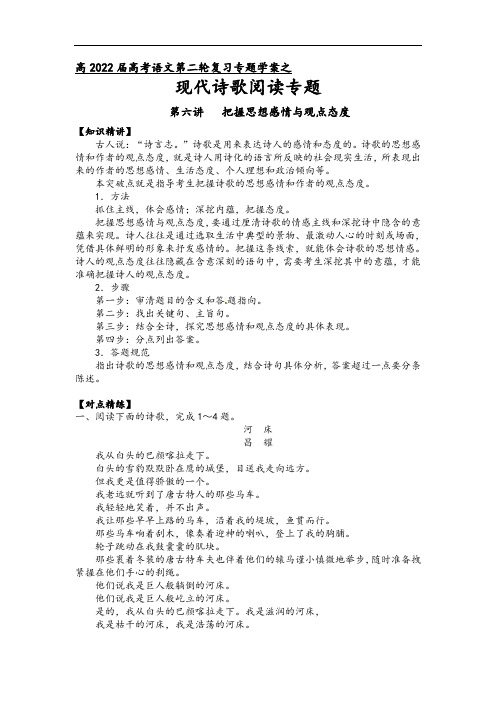
高2022届高考语文第二轮复习专题学案之现代诗歌阅读专题第六讲把握思想感情与观点态度【知识精讲】古人说:“诗言志。
”诗歌是用来表达诗人的感情和态度的。
诗歌的思想感情和作者的观点态度,就是诗人用诗化的语言所反映的社会现实生活,所表现出来的作者的思想感情、生活态度、个人理想和政治倾向等。
本突破点就是指导考生把握诗歌的思想感情和作者的观点态度。
1.方法抓住主线,体会感情;深挖内蕴,把握态度。
把握思想感情与观点态度,要通过厘清诗歌的情感主线和深挖诗中隐含的意蕴来实现。
诗人往往是通过选取生活中典型的景物、最激动人心的时刻或场面,凭借具体鲜明的形象来抒发感情的。
把握这条线索,就能体会诗歌的思想情感。
诗人的观点态度往往隐藏在含意深刻的语句中,需要考生深挖其中的意蕴,才能准确把握诗人的观点态度。
2.步骤第一步:审清题目的含义和答题指向。
第二步:找出关键句、主旨句。
第三步:结合全诗,探究思想感情和观点态度的具体表现。
第四步:分点列出答案。
3.答题规范指出诗歌的思想感情和观点态度,结合诗句具体分析,答案超过一点要分条陈述。
【对点精练】一、阅读下面的诗歌,完成1~4题。
河床昌耀我从白头的巴颜喀拉走下。
白头的雪豹默默卧在鹰的城堡,目送我走向远方。
但我更是值得骄傲的一个。
我老远就听到了唐古特人的那些马车。
我轻轻地笑着,并不出声。
我让那些早早上路的马车,沿着我的堤坡,鱼贯而行。
那些马车响着刮木,像奏着迎神的喇叭,登上了我的胸脯。
轮子跳动在我鼓囊囊的肌块。
那些裹着冬装的唐古特车夫也伴着他们的辕马谨小慎微地举步,随时准备拽紧握在他们手心的刹绳。
他们说我是巨人般躺倒的河床。
他们说我是巨人般屹立的河床。
是的,我从白头的巴颜喀拉走下。
我是滋润的河床,我是枯干的河床,我是浩荡的河床。
我的令名如雷贯耳。
我坚实、宽厚、壮阔,我是发育完备的雄性美。
我创造,我须臾不停地向东方大海排泻我那不竭的精力。
我刺肤文身,让精心显示的那些图形可被远观而不可近狎。
课件第6讲 态度与行为

3
实验三
研究者通过控制实验对象的环境因素,观察这些 因素对实验对象的态度和行为的影响。
实验研究结论总结
01
态度与行为之间存在密切关系
实验结果表明,人们的行为往往会受到其态度的影响和制约。
02
情境对态度与行为关系的影响
实验结果还表明,情境因素对态度与行为之间的关系也有重要影响。在
不同的情境下,人们即使持有相同态度,其行为反应也可能不同。
偏见的影响与后果
偏见的影响
偏见会影响人们的判断力、行为和决策 ,可能导致不公正和不合理的对待。
VS
后果
长期存在偏见可能导致社会不和谐、冲突 和分裂,对个人和社会都有负面影响。
05
态度与说服
说服的基本概念
定义
说服是改变或影响他人态度或行 为的过程。
目标
说服的目标通常是改变受众的态度 或行为,或者增强受众对某一观点 的接受程度。
行为强化态度
反复执行某一行为可能会强化对其的 态度。例如,经常锻炼可能会增强人 们对健康生活的态度。
态度与行为的一致性
态度和行为通常是一致的
通常情况下,人们的行为会与他们的态度一致。例如,拥有环保意识的人更有可 能采取环保行动。
行为和态度的不一致性
有时,人们的行为可能与其态度不一致。这可能是由于各种原因,如社会压力、 缺乏意志力或信息不完全等。例如,尽管有环保意识,但人们可能仍然使用一次 性塑料制品。
方法
说服可以通过多种方法进行,包括 口头交流、书面沟通、多媒体展示 等。
说服的效果与影响因素
效果:说服的效果可以体现在受众态度的改变、行为的改 变或对某一观点的接受程度提高等方面。
影响因素:说服的效果受到多种因素的影响,包括受众的 个人特征、说服者的权威性、信息的呈现方式等。
态度的形成与改变.ppt
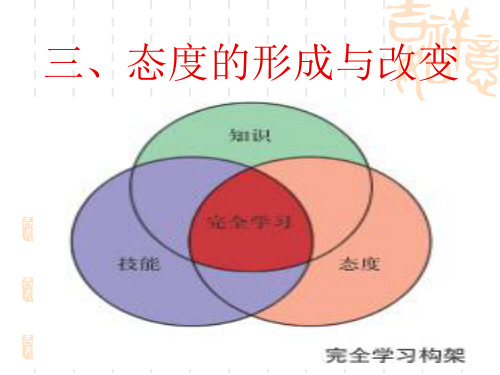
学习目标:
➢ 掌握态度的构成成分 ➢ 了解态度的特征 ➢ 讨论态度改变的策略 ➢ 阐述霍夫兰的说服模式的主要内容
▪ 罗曼•V•皮尔
▪ 在美国最畅销书排行 榜上整整待了十年时 间
▪ 著作在全世界的总销 量累计超过2亿册
▪ 把心理学和《圣经》 结合在一起
▪ 人生态度 ▪ 工作态度 ▪ 生活态度 ▪ 服务态度 ▪ 学习态度
3. 态度是学习的结果
态度的构成
举例:校园禁烟
▪ 支持者:
➢ 吸烟危害健康、浪费金 钱;
➢ 不喜欢吸烟,也不喜欢 别人吸烟;
➢ 支持禁烟运动。
▪ 不支持者:
➢ 吸烟是个人自由,吸烟 有一定的好处;
➢ 喜欢吸烟,还喜欢与大 家一起分享;
➢ 不支持禁烟。
态度的构成
态度的特征
1.各成分间的一致性 ➢ 态度的三个组成成 分倾向于一致。这 意味着某个成分的 认知成分 变化将导致其他成 (信念) 分的相应变化。
霍夫兰、可靠性)
受欢迎性
(外表、可爱、相似)
说服信息 与原态度间的差距 信息的呈现方式
新颖与重复
被说服者 人格 心情
免疫情况 卷入程度
态度改变
情境因素 预先警告 分散注意
活动: 角色扮演
➢ 肺病患者 ➢ 护士 ➢ 医生 ➢ 家属
小结
➢ 态度的构成包括认知、情感和行为倾向成分; ➢ 态度的特征:各成分间的一致性、中心性和强度; ➢ 态度改变的策略包括:情感技术(恐惧唤起、好心情
Motivation is to maximize rewards and minimize punishments
▪ 认知功能( Knowledge )
浙江大学---政治学第六讲:政治态度

二、政治意识形态
政治态度研究的两种路向:一是以政治态 政治态度研究的两种路向: 度和民主之间关系为主要背景的政治文化研究, 度和民主之间关系为主要背景的政治文化研究, 在这一领域, 在这一领域,阿尔蒙德和维巴的公民文化理论 产生了深远的影响; 产生了深远的影响;二是围绕政治态度与社会 存在之间关系而展开的政治意识研究, 存在之间关系而展开的政治意识研究,这一领 域中的代表性成就主要是由马克思及新马克思 主义者作出的,他们开创了一条通过“ 主义者作出的,他们开创了一条通过“意识形 概念进行政治分析的途径。 态”概念进行政治分析的途径。
马克思对意识形态理论的发展
马克思是最重要的意识形态理论家。他采 马克思是最重要的意识形态理论家。 纳了拿破仑以轻蔑的方式使用“意识形态” 纳了拿破仑以轻蔑的方式使用“意识形态”这 个词的态度, 个词的态度,但是由于马克思看到了意识形态 的存在论意义, 的存在论意义,所以他在批判意识形态时没有 过多地停留于意识形态的真假问题上, 过多地停留于意识形态的真假问题上,而是突 出地关注了意识形态在社会现实中的作用。意 出地关注了意识形态在社会现实中的作用。 识形态扭曲或掩蔽现实关系, 识形态扭曲或掩蔽现实关系,这在社会关系的 再生产过程中发挥了极其重要的作用。 再生产过程中发挥了极其重要的作用。
概念的提出
阿尔蒙德( ),代表作 阿尔蒙德(Almond,G.A.),代表作: ),代表作: 公民文化》 比较政治学》 《公民文化》、《比较政治学》等。1956年,他 年 政治学报》上发表文章, 在《政治学报》上发表文章,第一次提出政治文 化概念,被广泛接受。 年代与维伯 年代与维伯( 化概念,被广泛接受。60年代与维伯(Verba,S.) ) 合作的《公民文化》是这一领域的权威之作。 合作的《公民文化》是这一领域的权威之作。他 们在对美国、英国、德国、意大利和墨西哥5国 们在对美国、英国、德国、意大利和墨西哥 国 居民的基本政治态度进行大规模抽样调查和分析 比较的基础上写作而成的。共花了5年时间 年时间, 比较的基础上写作而成的。共花了 年时间,单 独采访了5000人,整个调查费用高达 万美元。 独采访了 人 整个调查费用高达200万美元。 万美元
第六讲(态度和说服)

社会心理学
重新认识人和社会
主讲:陈小刚 邮箱:1924692460@ 邮箱:
L/O/G/O
Q Q:1924692460
第三讲
态度和说服
Paul Joseph Goebbels ,
小说家,剧作家。1897年10 月29日,出生于信奉天主教 的家庭。幼时因患小儿麻痹 症而致使左腿萎缩,从天主 教中学毕业时,他代表全班 所作的毕业演讲获得好评。 从1917年夏到1921年春, Goebbels主要依靠天主教艾 尔伯特·马格努斯协会的资助, 先后在波恩大学、弗莱堡大 学、乌兹堡大学、慕尼黑大 学和海德堡大学攻读历史和 文学。1921年4月,在海德 堡大学犹太文学史家弗里德 里希·贡尔夫教授的指导下获 得哲学博士学位。 他致力于创作小说、剧 本和诗歌,著有小说《迈克 尔》、剧本《流浪者》和 《孤客》等。
你倾向于接受哪种途径的说服?
计分方式
• 第一步:对第3、4、5、7、8、9、12、16 、17提的分数进行转化:将1改为5;2改为 4;3不变;4改为2;5改为1. • 第二步:求和
三、说服途径的效用
1.中心途径 (1)逻辑 (2)实证 2. 2.边缘途径 (1)说服者:可信度、吸引力 (2)沟通方式:意图的显著性、单面(支持正面) 或双面(再加上反驳反面)、先说还是后说(首因 效应) (3)被说服者:分心的还是为分心的、智商高低、 自尊高低、年龄大小
作业六: 作业六:
逻辑和实证的重要意义
态度形成和改变的特点
• 新认知的获得是困难的 • 大多数人会被情感左右
态度及态度改变理论-PPT课件
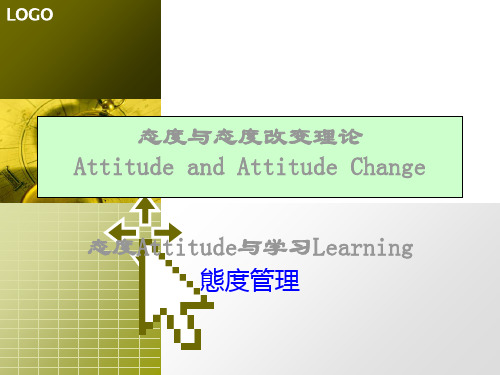
第一 态度概述
3、态度影响人的行为效率
学习效率的实验 过程:将一批大学生分为两组:第一组对 黑人和白人分校持反对态度,第二组持赞 同态度。让大学生分别阅读一篇反对黑人、 白人分校的文章,然后让被试把读过的文 章内容力求完整地写出来。 结果:第一组的成绩明显高于第二组。
2、不一致性改变
第三 态度改变的方法
二、影响态度改变的因素
1、态度系统本身的特点
时间性 一致性 极端性 需要性 多重性 价值中心 一贯性
第三 态度改变的方法
2、个体因素
智力与知识
性格特征
自我防卫 认识的需要
第三 态度改变的方法
3、个人与团体的关系 态度改变与团体密切相关,当一 个人对团体具有认同感和忠诚心时, 要让他采取与团体规范不一致的态 度不容易。
第二 态度的形成
2、态度形成的影响因素
欲望满足
知识(信息)
个人与团体的关系
其它因素
第二 态度的形成
二、态度理论(态度形成与转变的理论) 1、社会学习论 社会学习论把态度看作是在刺激—反应模 式中即社会刺激引起反应的作用下习得的。 认为其它形式的学习原理,也适用于态度的 形成和变化,态度就是在刺激的作用下逐渐 形成的和不断改变的。
第二 态度的形成
2、认知协调论
这一理论的核心思想(基本假设)是: 人的认知结构是一个平衡而协调的系统, 如果出现了不平衡、不协调,就会引起 心理上的不适感,从而引起认知结构的 改组,产生改变这种状态的趋势,以便 恢复协调。
(1)结构平衡理论
第二 态度的形成
弟子规第六讲读后感

弟子规第六讲读后感最近学习了《弟子规》的第六讲,内心颇有感触。
这一讲犹如一面镜子,让我清晰地看到了自身的不足,也为我指明了前进的方向。
在这一讲中,“谨”的部分让我印象尤为深刻。
“朝起早,夜眠迟,老易至,惜此时”,这几句简单的话语,却蕴含着深刻的道理。
它教导我们要珍惜时光,早起晚睡,充分利用每一分每一秒。
想想自己,常常因为贪恋温暖的被窝而赖床,浪费了许多清晨的美好时光。
夜晚又总是沉迷于手机、电视等娱乐,导致晚睡,第二天精神不振。
如今明白了时光匆匆,稍纵即逝,若不珍惜,到老时只能空留悔恨。
“冠必正,纽必结,袜与履,俱紧切”则强调了仪表的重要性。
一个人的外在形象往往反映出其内在的修养和态度。
保持衣冠整齐,不仅是对自己的尊重,也是对他人的尊重。
而我以前有时会不修边幅,出门时头发乱蓬蓬,衣服扣子也不扣好,现在想来,实在是有些不妥。
这看似微不足道的细节,却能影响他人对我们的看法,更能影响我们自身的心态和自信。
“置冠服,有定位,勿乱顿,致污秽”告诉我们要养成良好的生活习惯,物品摆放要有条理。
我的房间常常杂乱无章,衣服乱丢,书籍乱放,找东西时总是手忙脚乱。
学习了这一点后,我开始尝试整理自己的物品,给每样东西都找到固定的位置,果然让生活变得更加有序和高效。
“步从容,立端正,揖深圆,拜恭敬”让我明白了举止仪态的重要性。
行走时要从容不迫,站立时要身姿端正,行礼时要恭敬真诚。
在现代社会,虽然礼仪的形式可能有所变化,但尊重他人、注重自身仪态的核心思想永远不会过时。
而我有时在公共场合会急冲冲地走路,或者站没站相,坐没坐相,显得很没有教养。
“勿践阈,勿跛倚,勿箕踞,勿摇髀”是在提醒我们要注意日常的行为规范,不要踩门槛,不要斜靠着身子,不要叉开双腿坐,不要抖腿。
这些看似琐碎的规定,实际上是在培养我们的自律和自我约束能力。
回想自己,偶尔也会有这些不好的习惯,今后一定要加以改正。
“缓揭帘,勿有声,宽转弯,勿触棱”教导我们在日常生活中要小心谨慎,动作轻柔。
哈佛大学幸福公开课第六讲的观后感
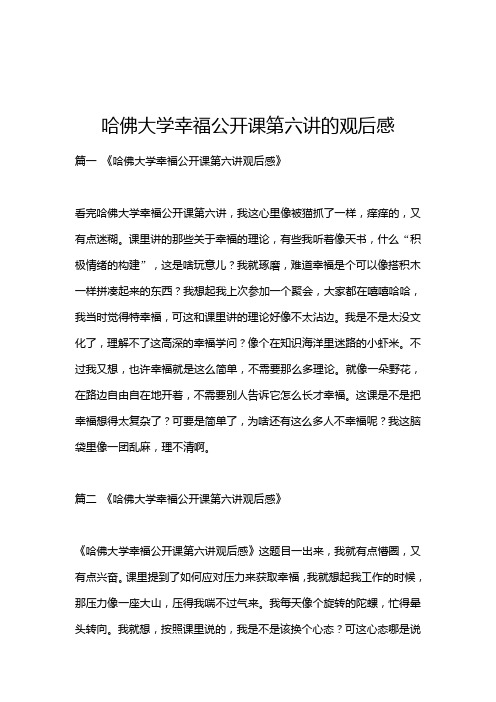
哈佛大学幸福公开课第六讲的观后感篇一《哈佛大学幸福公开课第六讲观后感》看完哈佛大学幸福公开课第六讲,我这心里像被猫抓了一样,痒痒的,又有点迷糊。
课里讲的那些关于幸福的理论,有些我听着像天书,什么“积极情绪的构建”,这是啥玩意儿?我就琢磨,难道幸福是个可以像搭积木一样拼凑起来的东西?我想起我上次参加一个聚会,大家都在嘻嘻哈哈,我当时觉得特幸福,可这和课里讲的理论好像不太沾边。
我是不是太没文化了,理解不了这高深的幸福学问?像个在知识海洋里迷路的小虾米。
不过我又想,也许幸福就是这么简单,不需要那么多理论。
就像一朵野花,在路边自由自在地开着,不需要别人告诉它怎么长才幸福。
这课是不是把幸福想得太复杂了?可要是简单了,为啥还有这么多人不幸福呢?我这脑袋里像一团乱麻,理不清啊。
篇二《哈佛大学幸福公开课第六讲观后感》《哈佛大学幸福公开课第六讲观后感》这题目一出来,我就有点懵圈,又有点兴奋。
课里提到了如何应对压力来获取幸福,我就想起我工作的时候,那压力像一座大山,压得我喘不过气来。
我每天像个旋转的陀螺,忙得晕头转向。
我就想,按照课里说的,我是不是该换个心态?可这心态哪是说换就换的,像脱一件紧身衣,难着呢。
我有次和朋友吐槽,朋友说我这是自找苦吃,我还不服气。
现在看了这课,我在犹豫,是不是真的是我自己的问题?这幸福是不是就藏在我对压力的态度里?像个调皮的小精灵,我找对了路它就出来,找不对就躲着我。
我是不是应该像个勇敢的探险家,去探索自己内心的世界,找到那个幸福的宝藏?可万一找了半天啥都没有呢?我这心里像十五个吊桶打水,七上八下的。
篇三《哈佛大学幸福公开课第六讲观后感》看了这公开课第六讲后,我内心像开了个杂货铺,啥情绪都有。
课里讲的关于人际关系对幸福的影响,让我感触挺深。
我记得我和邻居的关系以前不咋地,见面都不咋打招呼,像两个陌生人住在隔壁。
我当时觉得这没啥,可看了课之后,我就想,是不是我错过了很多幸福的机会?我是不是应该主动点,像个热情的小太阳,去融化这层冷漠的冰?可我又有点害怕被拒绝,像个胆小的乌龟,想伸头又缩回去。
态度和改变精华版
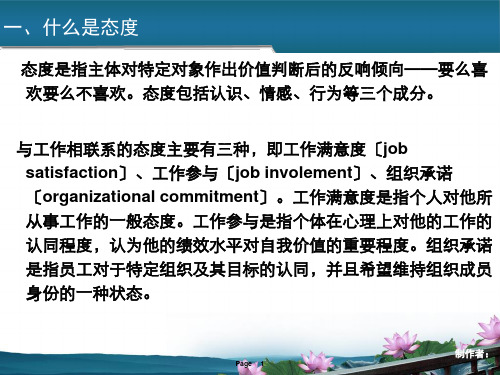
Page 25
制作者:
三、如何转变员工的态度
转变员工态度是指管理人员把员工消极的态度转变 成积极的态度,或者把较强的消极情绪转化为较弱 的消极情绪。 〔一〕影响员工态度转变的因素 1、外部因素 〔1〕人际影响 员工以他人作为参照系来对照自 己的行为 权威的上级、关系密切的同事,以及企业中非正式 组织的领导。
制作者:
平衡理论的用途:使人们以“最小努力原那么〞来预 计不平衡所产生的效应,使个体尽可能少地改变情感 关系,以恢复平衡构造。
Page 17
制作者:
〔三〕凯尔曼的态度改变与形成三阶段论
心理学家凯尔曼提出态度的形成过程有三个阶段:服 从、同化和内化。
服从〔顺从〕:一个人从外表上转变了自己的观点 〔是个体在遭受外部压力的情况下造成的〕
Page 12
制作者:
平衡构造的四种模式
O
O
+
+
+
-
O --
O
-
+
P
+X
P
- XP
+ X P -X
〔1〕P喜欢O,O喜欢X,于是P也喜欢X;
〔2〕P喜欢O,O不喜欢X,于是P也不喜欢X;
〔3〕P不喜欢O,O不喜欢X,于是P喜欢X;
〔4〕P不喜欢O,O喜欢X,于是P不喜欢X;
Page 13
制作者:
不平衡构造的四种模式
Page 30
制作者:
文化程度高者,双向宣传有效;文化程度低者,单向 宣传容易改变其态度。
当员工与管理层的观点一致,或者对问题不熟悉时, 单向宣传效果更好;如果员工与管理层的观点不同, 对问题又比较熟悉,双向宣传效果好。
适度的恐惧唤起有助于改变员工的态度。〔可采用中 等强度的恐惧〕
第六讲 人 生 观
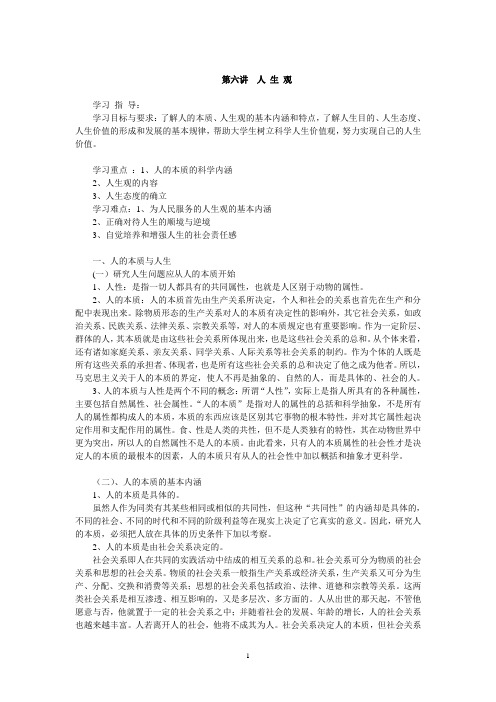
第六讲人生观学习指导:学习目标与要求:了解人的本质、人生观的基本内涵和特点,了解人生目的、人生态度、人生价值的形成和发展的基本规律,帮助大学生树立科学人生价值观,努力实现自己的人生价值。
学习重点:1、人的本质的科学内涵2、人生观的内容3、人生态度的确立学习难点:1、为人民服务的人生观的基本内涵2、正确对待人生的顺境与逆境3、自觉培养和增强人生的社会责任感一、人的本质与人生(一)研究人生问题应从人的本质开始1、人性:是指一切人都具有的共同属性,也就是人区别于动物的属性。
2、人的本质:人的本质首先由生产关系所决定,个人和社会的关系也首先在生产和分配中表现出来。
除物质形态的生产关系对人的本质有决定性的影响外,其它社会关系,如政治关系、民族关系、法律关系、宗教关系等,对人的本质规定也有重要影响。
作为一定阶层、群体的人,其本质就是由这些社会关系所体现出来,也是这些社会关系的总和。
从个体来看,还有诸如家庭关系、亲友关系、同学关系、人际关系等社会关系的制约。
作为个体的人既是所有这些关系的承担者、体现者,也是所有这些社会关系的总和决定了他之成为他者。
所以,马克思主义关于人的本质的界定,使人不再是抽象的、自然的人,而是具体的、社会的人。
3、人的本质与人性是两个不同的概念:所谓“人性”,实际上是指人所具有的各种属性,主要包括自然属性、社会属性。
“人的本质”是指对人的属性的总括和科学抽象,不是所有人的属性都构成人的本质,本质的东西应该是区别其它事物的根本特性,并对其它属性起决定作用和支配作用的属性。
食、性是人类的共性,但不是人类独有的特性,其在动物世界中更为突出,所以人的自然属性不是人的本质。
由此看来,只有人的本质属性的社会性才是决定人的本质的最根本的因素,人的本质只有从人的社会性中加以概括和抽象才更科学。
(二)、人的本质的基本内涵1、人的本质是具体的。
虽然人作为同类有其某些相同或相似的共同性,但这种“共同性”的内涵却是具体的,不同的社会、不同的时代和不同的阶级利益等在现实上决定了它真实的意义。
第六讲 公众心理分析
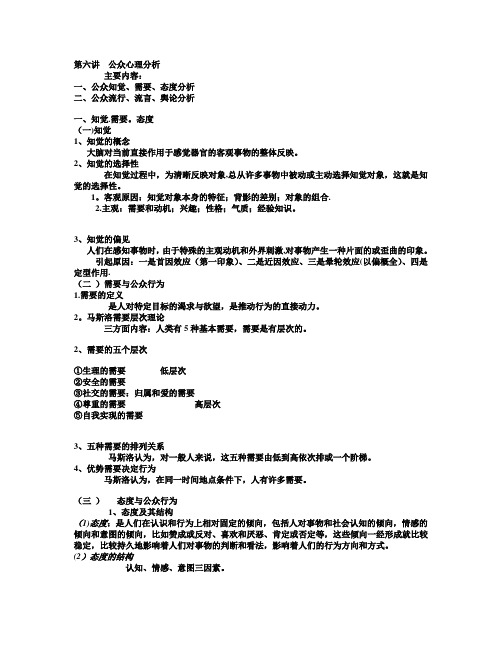
第六讲公众心理分析主要内容:一、公众知觉、需要、态度分析二、公众流行、流言、舆论分析一、知觉.需要。
态度(一)知觉1、知觉的概念大脑对当前直接作用于感觉器官的客观事物的整体反映。
2、知觉的选择性在知觉过程中,为清晰反映对象,总从许多事物中被动或主动选择知觉对象,这就是知觉的选择性。
1。
客观原因:知觉对象本身的特征;背影的差别;对象的组合.2.主观:需要和动机;兴趣;性格;气质;经验知识。
3、知觉的偏见人们在感知事物时,由于特殊的主观动机和外界刺激,对事物产生一种片面的或歪曲的印象。
引起原因:一是首因效应(第一印象)、二是近因效应、三是晕轮效应(以偏概全)、四是定型作用.(二)需要与公众行为1.需要的定义是人对特定目标的渴求与欲望,是推动行为的直接动力。
2。
马斯洛需要层次理论三方面内容:人类有5种基本需要,需要是有层次的。
2、需要的五个层次①生理的需要低层次②安全的需要③社交的需要:归属和爱的需要④尊重的需要高层次⑤自我实现的需要3、五种需要的排列关系马斯洛认为,对一般人来说,这五种需要由低到高依次排或一个阶梯。
4、优势需要决定行为马斯洛认为,在同一时间地点条件下,人有许多需要。
(三)态度与公众行为1、态度及其结构(1)态度:是人们在认识和行为上相对固定的倾向,包括人对事物和社会认知的倾向,情感的倾向和意图的倾向,比如赞成或反对、喜欢和厌恶、肯定或否定等,这些倾向一经形成就比较稳定,比较持久地影响着人们对事物的判断和看法,影响着人们的行为方向和方式。
(2)态度的结构认知、情感、意图三因素。
2、态度的特征1。
态度的社会性2。
态度的针对性3.态度的协调性4。
态度的稳定性5。
态度的两极性6。
态度的间接性3、影响和改变态度的因素:1.社会因素2.团体因素3。
宣传因素4。
个性因素4、霍夫兰的说服模式霍夫兰认为人的态度的改变主要取决于以下三方面:(1)说服者的条件(2)信息本身的说服力(3)问题的排列技巧二、流行、流言以及舆论(一)流行1、流行的概念:流行(或时尚)是一种群众性的社会心理现象,是指导社会上许多人都去追求某种生活方式,使这种生活方式在较短的时期内到处可见,从而导致了彼此之间发生连锁性的感染,即所谓的“一窝蜂"现象。
- 1、下载文档前请自行甄别文档内容的完整性,平台不提供额外的编辑、内容补充、找答案等附加服务。
- 2、"仅部分预览"的文档,不可在线预览部分如存在完整性等问题,可反馈申请退款(可完整预览的文档不适用该条件!)。
- 3、如文档侵犯您的权益,请联系客服反馈,我们会尽快为您处理(人工客服工作时间:9:00-18:30)。
第六讲态度与态度的改变一、态度的本质1、态度的定义Attitude : A favorable or unfavorable evaluative reaction toward something or someone ,exhibited in one’s beliefs ,feelings ,or intended behavior .对人、事物、理念等等的评价。
2、态度的ABC理论态度由三部分组成:A:情感成分,对态度对象的情绪反应;B:行为意向成分,对态度对象的反应倾向C:认知成分,对态度对象的观念;3、态度的两种形式:外显态度和内隐态度外显态度explicit attitudes:指我们意识到的并易于报告的态度。
内隐态度implicit attitudes:指自然而然的,不受控制的,并且往往是无意识的态度。
4、态度与行为的关系4.1态度和行为一致吗?例1:拉皮埃尔的实验1934第一部分:现场研究-----带领一对中国留学生夫妇,游历美国,行程数万里。
到了66家旅馆和184家饭店,只有一家拒绝接待。
单独访问也未被拒。
第二部分:问卷研究-----6个月后,对去过的每一家旅馆和饭店进行问卷调查。
作为比较,对未去过的一些饭店和旅馆也做了同样调查。
结果?结果普遍高度拒绝,每一类只有1家明确表示愿意,拒绝率高达90%以上。
实验结果的分析不一致的原因之一:表达出来的态度并非是内心的真实态度。
不一致的原因之二:人们的有些行为是情境的产物。
批评意见:1、问卷中的“中国人” 太一般化。
对“中国人”刻板印象和对有教养的、穿着体面的留学生夫妇的印象可能完全不同。
2、回答问卷者可能是对中国人有极端偏见的人。
3、6个月后回答问卷的人也许不是他们曾经遇到的人了。
例2:一项“道德伪善者”研究Daniel Batson (1997-2002):they presented their people with an appealing task (where the participant could earn raffle tickets toward a $30 prize ) and a dull task with no positive consequences .the participants had to assign themselves to one task and a supposed second participant to the other .ResultOnly 1 in 20 believed that assigning the positive task to themselves was the mostmoral thing to do ,yet 80 percent did so .扔硬币 :90 percent assigned themselves to the positive task!在硬币上作标记4.2态度和行为,谁决定谁?Does Behavior Determine Attitudes?角色扮演Role :a set of norms that defines how people in a given social position ought to behave .When enacting new social roles ,we may at first feel phony .but our unease seldom lasts .话语出口则成真When induced to give spoken or written witness to something they doubt ,people will often feel bad about their deceit .nevertheless ,they begin to believe what they are saying ---provided they weren’t bribed or coerced(强迫) into doing so.罪恶的行为与态度The attitudes-follow-behavior principle works with immoral acts as well. Evil sometimes results from gradually escalating(升级) commitments .A trifling evil act can make a worse act easier .Evil acts gnaw(侵蚀) at the actor’s moral sensitivity .4.3Why Does our Behavior Affect our Attitudes?Self-Presentation: Impression ManagementSelf-Justification(自我辩护): Cognitive DissonanceInsufficient JustificationDissonance After DecisionsSelf-PerceptionExpressions and AttitudeOverjustification and Intrinsic MotivationsComparing the TheoriesDissonance as ArousalSelf-Perceiving When Not Self-Contradicting二、态度如何形成和改变的?1、态度从何而来?以认知为基础的态度:一种主要根据人们对于态度对象的认知而形成的态度。
(权衡得失:一辆汽车的客观价值)以情感为基础的态度:一种根据人们的感觉和价值观而不是对态度对象本质的事实而形成的态度。
(就是喜欢!可能来自于价值观、审美反应、感觉反应、条件反射等)以行为为基础的态度:这种态度是基于对态度对象所表现出来的行为的观察。
(我喜欢是因为我这样做)2、态度形成和改变的理论解释:2.1学习理论原理:立足于行为主义的立场,认为态度形成和改变的过程也是一种学习的过程,因此,适用于其他学习形式的原则,也适用于态度。
经典条件反射(某食物出现,父母皱眉--父母皱眉,孩子不悦--某食物出现,孩子不悦)操作性条件反射(为讨得父亲的微笑,表示与父亲相同的看法)观察学习(儿童常常学会了父母所做的,而不是父母所说的,如赌博、吸烟)2.2功能理论原理:主要立足于精神分析的立场,认为态度的形成和改变有其深层的心理动力根源,而态度的功能在于满足个体特殊的心理需求。
功能理论把态度与个体的内在需要联系起来,因此突出了持有和改变态度的个体差异。
认为,要有效地改变一个人的态度,就必须了解他支配着这一态度的心理需要是什么。
了解需要—改变需要—态度改变2.3 平衡理论重视人与人之间的相互影响在态度转变中的作用。
人们态度系统中存在情感因素或评价因素之间的趋于一致的压力。
如果不平衡,则会向平衡方面转化,且遵循费力最小原则。
2.4认知失调理论费斯廷格(1957)认为个体关于自我、环境和态度对都有认知因素,当出现认知失调时,会给个体造成压力,这时就会通过改变态度的认知成分,来达到认知的协调状态。
减少认知失调的途径:改变或否定失调的认知因素的一方引入新的认知因素,改变原有有不协调关系降低失调的认知因素双方的强度关于戒烟的态度与行为*改变态度:改变自己对戒烟的态度,使其与以前的行为一致(我喜欢吸烟,我不想真正戒掉)。
*增加认知:如果两个认知不一致,可以通过增加更多一致性的认知来减少失调(吸烟让我放松和保持体型,有利于我的健康)。
*改变认知的重要性:让一致性的认知变得重要,不一致性的认知变得不重要(放松和保持体型比担心30年后患癌更重要)。
*减少选择感:让自己相信自己只所以做出与态度相矛盾的行为是因为自己没有选择(生活中有如此多的压力,我只能靠吸烟来缓解,别无他法)。
*改变行为:使自己的行为不再与态度有冲突(我将再次戒烟,即使别人给也不再抽烟)。
3、走向实践:如何改变别人的态度3.1、通过改变行为来改变态度(自我觉知或认知失调引起态度改变?)反态度辩护:指一个人提出与其个人的信念和态度相反的意见或态度。
是一种有力的改变态度的方式。
如何让大学生主动节约水?3.2、说服性沟通与态度改变说服性沟通:在某一问题上支持特定观点的沟通,如演讲或电视广告。
1) 影响说服的因素传递者:威信、立场、意图、吸引力沟通信息:差异、畏惧、信息提供方式(单面与双面说服)信息传递的方式:面对面、视频、书面接受者:原有的态度的强度、心理倾向、人格因素等情境因素:分心、重复、预先警告。
如果预先告诉或暗示被说服者他将收到与他立场相矛盾的信息,此时这个人的态度将难以改变,预先的警告会使人产生拒抗,但这仅限于讨厌的信息。
Apsler (1968)的观点代表了人们对这个问题的一般看法:当个体对问题了解得很多时,预先警告会引起拒抗,而当人们对该问题了解较少时,预先警告反而有助于态度改变。
分散注意,分散注意力能减少抗拒,因而对改变态度有利。
态度转变的实证研究:专长性的研究阿龙森:1963研究者请被试来参加一项美学的实验,并要求他们评价选自无名现代诗的九个节段。
接着,让他们读另一个人对其中一节诗(被试最不喜欢的一节)所作的评论,说它好。
告诉一部分被试这篇评论出于著名诗人之手,而告诉另一部分被试它出自一个师范学院的学生之手。
然后,让被试对这一节诗再作一次评价,看看有无改变。
结果:改变幅度相差2-4倍。
可靠性的研究沃尔斯特:1966研究者让甲组被试听到一份“加强法制和扩大警察和法庭权力以严管罪犯”的呼吁;让乙组被试听到另一份“反对警察和法庭权力过大,以保护被告权利”的呼吁。
然后,将两组被试各分两半:告诉一半人这份呼吁是检查官的建议;告诉另一半这份呼吁是被判刑罪犯的申求。
让被试谈谈自己是否同意呼吁中的建议。
结果?恐惧唤起的研究(贾尼斯1953)让高校学生来看一场电影,电影内容强调饭后须刷牙,一天要刷三次的重要性,并指明不这样做的危险。
将被试处于三种条件下:1、看到严重蛀齿和齿龈溃烂、以及牙齿脱落的画面。
高恐惧组2、看到的是很少有戏剧性和惊吓的画面。
中恐惧组3、看到的是没有病害的牙齿。
低恐惧组结果:1、看后谈观感2、一周后对被试的行为调查分析一下,哪一组改变最大?2)说服的中心路径和外周路径如何选择合适的沟通方式?精细可能性模型(elaboration likelihood model)(petty&cacioppp, 1986; petty, priester, & brinol, 2002)有两种说服性沟通方式可以引起态度改变:一是中心路径,人们有动机有能力专注于沟通中的逻辑论证;二是外周路径,人们不去注意逻辑论证而受表面特征(如演讲者是谁)的影响。
